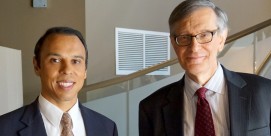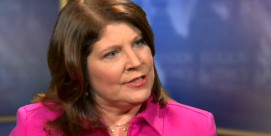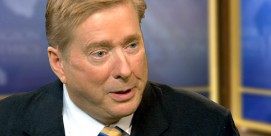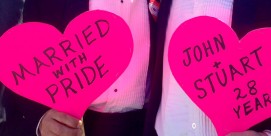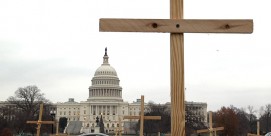In This Episode << SLIDE LEFT TO SEE ADDITIONAL SEGMENTS
Clergy and Same-Sex Marriage
UNIDENTIFIED MINISTER (performing marriage ceremony): Today we celebrate the first legal marriage of two women at All Saints.
KIM LAWTON: Susan Craig and Bear Ride have been partners for 12 years. They’re both ordained Presbyterian ministers, and when California legalized same-sex marriage they knew they wanted a church wedding.
Reverend SUSAN CRAIG: It means everything to be here under the watchful eyes of God and the saints above, the community all around us, in this very special community for us.
LAWTON: They got married last week not in a Presbyterian church, but at All Saints Episcopal Church in Pasadena.
Reverend BEAR RIDE: At this point it would be a chargeable offense for a Presbyterian minister to officiate at our wedding, a legal wedding, because in the church — the church’s constitution — a marriage is a civil contract. It says between a man and a woman and a covenant between two people who love each other. That’s archaic language now in California.

Same sex marriage ceremony |
LAWTON: As California moves full steam ahead with gay marriage, clergy are being pressured to perform same-sex weddings and to perform them inside their houses of worship. This is generating new debates because many religious traditions explicitly define marriage as between a man and a woman. Some clergy, including Roman Catholics and evangelicals, have refused to be part of gay marriages. But others, especially mainline Protestants, are more conflicted.
Mary Holder Naegeli is a Presbyterian minister in San Francisco who agrees with her denomination’s opposition to gay marriage.
Reverend MARY HOLDER NAEGELI: Why would I, a representative of God, help people make permanent with a vow — I take marriage vows very seriously — but with a vow to make permanent then, seal something that God wouldn’t agree with? God wouldn’t bless that. That’s my basic conscience problem with the whole issue.
LAWTON: But she says it is a challenge to balance her beliefs with her state’s new marriage policy.
Rev. HOLDER NAEGELI: Sociologically, there is going to be more and more pressure to not only accept, or tolerate, let’s say, something that is not of God’s design, but to promote it and to make it normative in the life of Californians, which, you know, when you hold a biblical position like I do, makes life really uncomfortable.

Mary Holder Naegeli |
LAWTON: At the Presbyterian Church USA’s General Assembly this week, held coincidentally in California, there was vigorous debate about whether the denomination should change its rules about marriage. Reverend Bruce Reyes-Chow, the church’s new moderator, acknowledged there are strong divisions.
Reverend BRUCE REYES-CHOW (Moderator, Presbyterian Church USA, speaking at General Assembly meeting): Can we agree to disagree on the issue of homosexuality? I think that is a question that we as a body have to really struggle with because it’s difficult to live out of both sides of that thought.
LAWTON: For many, it comes down to interpreting whether the Bible indeed says that marriage should only be for a man and a woman.

Bear Ride |
Rev. HOLDER NAEGELI: We have several instances from beginning to end of Scripture that make that point. There isn’t any wiggle room. There’s no softening of that position anywhere.
LAWTON: Reverend Ride disagrees.
Rev. RIDE: If you look through the Bible, there are all sorts of different types of marriage. You know, it’s very common to have multiple wives. Or concubines are fine. I think we’re picking and choosing the biblical concept of marriage.
LAWTON: While clergy continue to debate whether or not to perform gay weddings, California voters will soon be weighing in as well. A measure to ban gay marriage is set to be on the ballot in November.
I’m Kim Lawton in Pasadena.
ABERNETHY: In anticipation of that vote, many evangelicals and the Church of Jesus Christ of Latter-day Saints, the Mormons, are organizing efforts to support the gay marriage ban.

